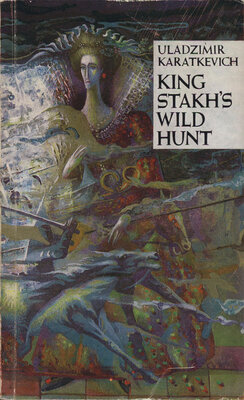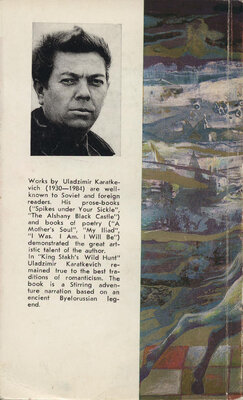King Stakh's Wild Hunt
Уладзімір Караткевіч
Выдавец: Мастацкая літаратура
Памер: 248с.
Мінск 1989
“I have seen you,” she repeated. “But who are you? I do not know you.”
“My name is Andrei Belaretzky, Miss Yanowskaya. I am an ethnographer.”
She wasn’t at all surprised. On the contrary, on learning that she knew this word, it was I who was surprised.
“Well, that is very curious. And what interests you? Songs? Sayings? Proverbs?”
“Legends, Miss Yanowskaya, old local legends.”
I got terribly frightened. It was no laughing matter: she suddenly straightened up as if an electric current had been passed through her, torturing her. Her face became pale, her eyelids closed.
I rushed over to her, supported her head, and put a glass of water to her lips, but she had already come to. And her eyes sparkled with such indignation, with such an inexplicable reproach in them, that I felt as if I were the worst scoundrel on earth, although I had not the faintest idea why I should not speak about my profession. A vague idea flashed through my mind that something was connected with the old rule: “never speak of woe in the house whose master has been hanged.”
In a broken voice she said:
“And you... And you, too... why do you torture me, why does everybody?...”
“My dear lady! Upon my word of honour, I had nothing harmful in mind, I don’t know anything... Look, here is my certificate from the Academy. Here is a letter from the governor. I’ve never been here before. Please forgive me, for heaven’s sake, if I have caused you any pain.”
“Never mind,” she said. ’’Never mind, calm yourself, Mr. Belaretzky... It’s simply that I hate what savages can create in the minds of savages. Perhaps you, too, will some day understand what it is... this gloom. Whereas I understood what it is long ago. But I’ll be dead long before everything will have become clear to me.”
I realized it would be tactless to question her any further, and I kept silent. It was only after a while, when she had calmed down that I said:
“I beg your pardon for having disturbed you, Miss Yanowskaya, I see that I have immediately become an unpleasant person for you. When must I leave? It seems to me the sooner the better.”
Again that distorted face!
“Ah! As if that were the trouble! Don’t leave us. You will offend me deeply if you leave now. And besides,” her voice began to tremble, “what would you say if I asked you to remain here, in this house, for at least two or three weeks? Until the time when the dark autumn nights are over?”
Her look began to wander. On her lips a pitiful smile appeared.
“Afterwards there will be snow... And footprints in the snow. Of course, you will do as you
see fit. However, it would be unpleasant for me were it to be said of the last of the Yanowskys that she had forgotten the custom of hospitality.”
She said ‘‘the last of the Yanowskys” in such a way, this eighteen-year-old girl, that my heart was wrung with pain.
“Well then,” she continued, “if this awful stuff interests you, how can I possibly object? Some people collect snakes. We here have more spectres and ghosts than living people. Peasants, shaken with fever, tell amazing and fearful stories. They live on potatoes, bread made of grasses, porridge without butter, and on fantasy. You mustn’t sleep in their huts: it’s dirty there and congested, and all is evilly neglected. Go about the neighbouring farmsteads, there for money that will go to buy bread or vodka, warming up for a moment the blood that is everlastingly cold from malaria, they will tell you everything. And in the evening return here. Dinner will be ready, awaiting you here, and a place to sleep in, and a fire in the fireplace. Remember this — I am the mistress here, and the peasants obey me. Agreed?”
By this time I was already quite certain that nobody obeyed this child, nobody was afraid of her, and nobody depended on her. Perhaps, had it been anybody else, I might have smiled into her eyes, but in this “command” of hers there was so much entreaty that I did not yet quite understand, and I said with my eyes lowered:
“Alright. I agree to your wish.”
She did not notice the ironic gleam in my eyes and for a moment even blushed, apparently because somebody had obeyed her.
The left-overs of a very modest supper were removed from the table. We remained in our
armchairs before the fireplace. Yanowskaya looked around at the black windows behind which the branches of enormous trees rubbed against, and said:
“Perhaps you are ready for sleep now?”
This strange evening had put me into such a mood that I had lost all desire for sleep. And here we were sitting side by side looking into the fire.
“Tell me,” she suddenly said. “Do people everywhere live as we do here?”
I glanced at her, puzzled: hadn’t she ever been anywhere outside of her home? As if she had understood me, she said: “I’ve never been anywhere beyond this plain in the forest... My father, he was the best man living on earth, taught me himself, he was a very educated man. I know, of course, what countries there are in the world. I know that not everywhere do our fir-trees grow, but tell me, is it everywhere so damp and cold for man to live on this earth?”
“Many find life cold on this earth, Miss Yanowskaya. The people who thirst for power are to blame for that, they wish for power that is beyond their ability to exert. Also money is guilty, money for the sake of which people grab each other by the throat. However, it seems to me that not everywhere is it so lonely as it is here. Over there, beyond the forests, there are warm meadows, flowers, storks in the trees, as well as impoverished and oppressed people; but there the people somehow seek escape. They decorate their homes, women laugh, children play. While here there is very little of all that.”
“I suspected that,” she said. “That world is alluring, but I am not needed anywhere except at Marsh Firs. And what should I do there for money if money is necessary? Tell me: such
things as love and friendship, do they exist there, at least now and then? Or is it so only in the books that are in my father’s library?”
Again I did not for a moment suspect that this was an equivocal joke, though I was in quite an awkward position: sitting at night in a room and conversing with a young lady whom I hardly knew, talking about love, the subject having been brought up by her...
“Sometimes those things happen there.”
“There, that’s what I say. It’s impossible that people lie. But here we have nothing of the kind. Here we have the quagmire and gloom. Here we have wolves... wolves with fiery eyes. On such nights it seems to me that nowhere on this earth, nowhere does the sun shine.”
It was terrifying to see a dry black gleam in her eyes, and in order to change the subject, I said:
“It can’t be that your father and mother did not love each other.”
Her smile was enigmatic:
“Our people do not love. This house sucks the life out of its people. And then who told you that I had a mother? I don’t remember her, nobody in this house remembers her. At times it seems to me that my appearance in this world was of my own doing.”
In spite of the naivety of these words, I understood that this was an unknown scene from Decameron and one must not laugh, because it was all so terrible. A young girl was sitting near me talking of things that she had long been hiding in her heart and which, however, had no greater reality for her than angels in heaven had for me.
“You are mistaken,” I growled, “love never
theless, even though rarely, does come our way on earth.”
“Wolves cannot love. And how can one love, if death is all around? Here it is, beyond the window.”
A very thin, transparent hand pointed to the black spots on the windows. And again her fine voice:
“Your lying books write that it is a great mystery, that it is happiness and light, that when love comes to a man and there is no reciprocation, he kills himself.”
“Yes,” I answered, “otherwise there would be neither men nor women.”
“You lie. People kill others, not themselves. I don’t believe in it, I’ve never experienced it, which means that it doesn’t exist. I don’t wish to kiss anybody, about which your books write so much and so queerly,— people bite each other.”
Even now such talk frightens some men, what then is there to say about those times? I am not an unfeeling sort of person, but I felt no shame: she spoke about love as other women do about the weather. She did not know it, she had not been awakened, was quite cold, cold as ice. She could not even understand whether it was shameful or not. And her eyes looked frankly into mine.
This could not have been coquetry. This was a child, not a child even, but a living corpse.
She wrapped her shawl about her and said:
“Death reigns on earth. That I know. I don’t like it when people lie about what has never existed on our earth.”
Beyond the walls the wind howled. She shrugged her shoulders and said quietly:
“A terrible land, terrible trees, terrible nights.”
And again I saw that same expression on her face and did not understand it.
“Tell me, they are large cities — Vilna and Minsk?”
“Rather large, but Moscow and Petersburg are larger.”
“And there, too, the nights bring no comfort to people?”
“Not at all. In the windows lights burn, in the streets people laugh, skates ring, street lamps shine.”
She became thoughtful.
“That’s so there. But here not a single light. Surrounding this old park two versts on every side, lonely huts are asleep, sleeping without any lights. In this house there are about fifty rooms, many corridors and passages with dark corners. It was built so long ago... And it is a cold house, for our ancestors forbade laying stoves, they allowed only fireplaces in order to be unlike their common neighbours. The fireplaces burn day and night, but even so there is dampness in the corners and cold everywhere. And in these fifty rooms there are only three people. The housekeeper sleeps on the ground floor and the watchman also. And in one of the wings behind the alleys and the park the cook and the washerwoman live. They live well. And in the second annex to this house, with its separate entrance, my manager lives, Ignat Berman-Gatzevich. Whatever we need this manager for, I do not know, but such is the law. And in this house, on the entire first floor with its 30 rooms, I am the only one. And it is so uncomfortable here that I’d like to get into some corner, wrap myself up in my blanket
 КНІГІ ОНЛАЙН
КНІГІ ОНЛАЙН


